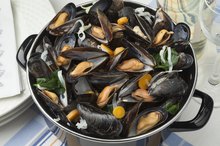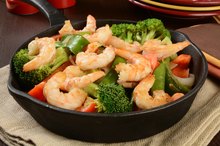What does fact checked mean?
At Healthfully, we strive to deliver objective content that is accurate and up-to-date. Our team periodically reviews articles in order to ensure content quality. The sources cited below consist of evidence from peer-reviewed journals, prominent medical organizations, academic associations, and government data.
The information contained on this site is for informational purposes only, and should not be used as a substitute for the advice of a professional health care provider. Please check with the appropriate physician regarding health questions and concerns. Although we strive to deliver accurate and up-to-date information, no guarantee to that effect is made.
Vitamins in Shrimp
Shrimp are crustaceans that may be served hot or cold. This nutritious, protein-rich alternative to meat has, when raw, a translucent, firm yet tender, mild tasting flesh. Like all shellfish, shrimp contains some cholesterol but is very low in calories, total fat and saturated fat. Shrimp is rich in vitamins and minerals. The major vitamins in shrimp include vitamin D, vitamin B12 or cobalamin and vitamin B3 or niacin.
Vitamin D
According to the World's Healthiest Foods website, 15 large shrimp, or a 4 oz 1. serving of steamed or boiled shrimp provides roughly 162 IU vitamin D, which meets 40 percent of the Recommended Daily Value or DV for this nutrient based on 400 IU. Thus, shrimp are an excellent source of vitamin D. Vitamin D helps with the absorption of calcium and phosphorus in order to build and maintain strong bones and teeth. Vitamin D is also important for immune system function and promoting healthy skin.
Vitamin B12
Nutritional Value of Fried Oysters
Learn More
Vitamin B12 or cobalamin is a nutrient found in animal foods, such as:
- meat
- poultry
- fish
- eggs
- dairy
There are very few vegan food sources of this essential nutrient. However, shrimp is one of the better food sources. A 4 oz. cooked portion provides 1.7 micrograms (mcg), which meets just over 28 percent of the DV based on 6 mcg. Vitamin B12 is required for optimal function of the nervous system as well as DNA synthesis and the formation of red blood cells.
- Vitamin B12 or cobalamin is a nutrient found in animal foods, such as: * meat
* poultry
* fish
* eggs
* dairy There are very few vegan food sources of this essential nutrient.
Vitamin B3 - Niacin
A 4 oz. serving of steamed or broiled shrimp, or 15 large shrimp, provide 3.5 mg vitamin B3 or niacin according to the U.S. Department of Agriculture National Agricultural Library database. The DV for niacin is 20 mg daily; thus, this amount meets 17.5 percent of the DV, making it a good food source.
Related Articles
References
- World's Healthiest Foods: Shrimp
- MayoClinic.com: Nutrition and Healthy Eating: What does Percent Daily Value mean on food labels?
- Soliman GA. Dietary cholesterol and the lack of evidence in cardiovascular disease. Nutrients. 2018;10(6). doi:10.3390/nu10060780
- Shrimp, steamed or boiled. FoodData Central. U.S. Department of Agriculture. Published April 1, 2020.
- Can you get jumbo benefits from eating shrimp?. Tufts University Gerald J. and Dorothy R. Friedman School of Nutrition Science and Policy. Updated 2013.
- Choline. Oregon State University. Linus Pauling Institute. Updated in 2015.
- Tischmann L, Drummen M, Gatta-Cherifi B, et al. Effects of a high-protein/moderate-carbohydrate diet on appetite, gut peptides, and endocannabinoids-A preview study. Nutrients. 2019;11(10). doi:10.3390/nu11102269
- Barros MP, Poppe SC, Bondan EF. Neuroprotective properties of the marine carotenoid astaxanthin and omega-3 fatty acids, and perspectives for the natural combination of both in krill oil. Nutrients. 2014;6(3):1293-317. doi:10.3390/nu6031293
- Bonjour JP. Protein intake and bone health. Int J Vitam Nutr Res. 2011;81(2-3):134-42. doi:10.1024/0300-9831/a000063
- Shellfish allergy. American College of Allergy, Asthma & Immunology. Updated 2019.
- Shrimp. Seafood Health Facts: Making Smart Choices Balancing the Benefits and Risks of Seafood Consumption. Updated 2020.
- Selecting and serving fresh and frozen seafood safely. U.S. Food and Drug Administration. 2019.
- Food safety risks for pregnant women. Academy of Nutrition and Dietetics. Updated 2018.
Writer Bio
Michele Turcotte is a registered, licensed dietitian, and a certified personal trainer with the National Academy of Sports Medicine. She has more than 12 years of experience in clinical and corporate settings, and has extensive experience in one-on-one diet counseling and meal planning. She has written freelance food and nutrition articles for Trouve Publishing Inc. since 2004.









